Fertility supplements are combinations of vitamins, minerals, nutrients, and herbal extracts that can help improve your chances of getting pregnant.
Some fertility supplements specifically focus on male fertility, while others focus on female fertility.
If you want to improve your chances of conception by naturally boosting your fertility, our researchers have taken a look at the top fertility supplements on the market and ranked the top ten in order of quality. Here are our rankings.
Research
Rankings
1. Concepta Solutions Women’s Fertility Boost
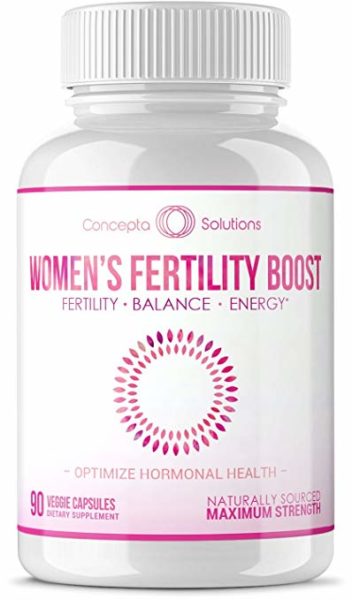
Concepta Solutions has a unique take on women’s fertility. Their Women’s Fertility Booster has top ingredients for egg health and fertility, like myo-inositol and zinc, but the supplement also includes ingredients for improving women’s libido and mental well-being, like the neurotransmitter 5-HTP and melatonin.
Their fertility blend is holistic, well-designed, and well-thought out. For this reason, it’s our top pick for women.
2. Eu Natural Conception Men
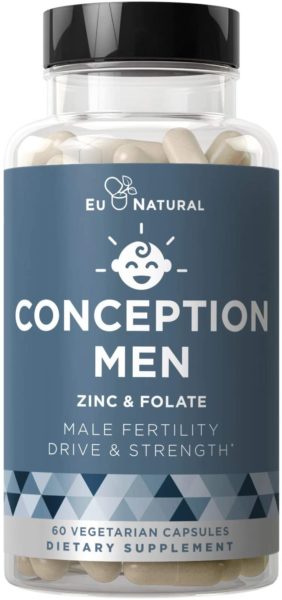
Eu Natural Conception Men has a wide range of vitamin, mineral and herbal ingredients for improving men’s sexual wellness and fertility.
These include simple ingredients like zinc and selenium, as well as herbal extracts that enhance the utility of these vitamins and minerals, like ashwagandha. For men looking for a fertility supplement, this is our top choice.
3. Everett Laboratories Pregnitude
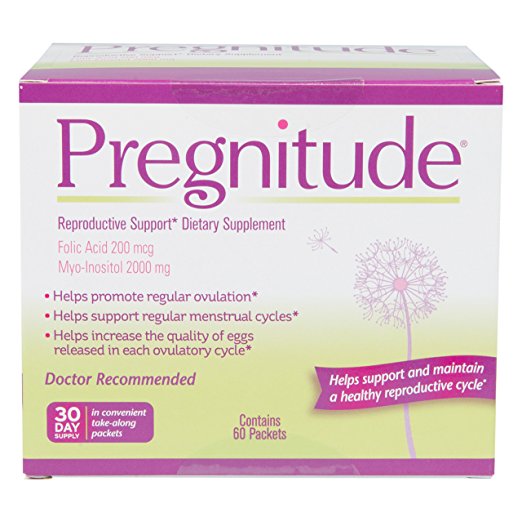
Everett Laboratories Pregnitude includes only two ingredients, but they are two of the most effective supplements when it comes to increasing women’s fertility.
These two ingredients are folic acid and myo-inositol, which have both been the focus of quite a bit of scientific research on both fertility and pregnancy.
Both of these supplements have the added advantage of being protective of fetal health once you do get pregnant. As far as fertility supplements directed specifically at women, this a solid choice.
4. Pink Stork Fertility
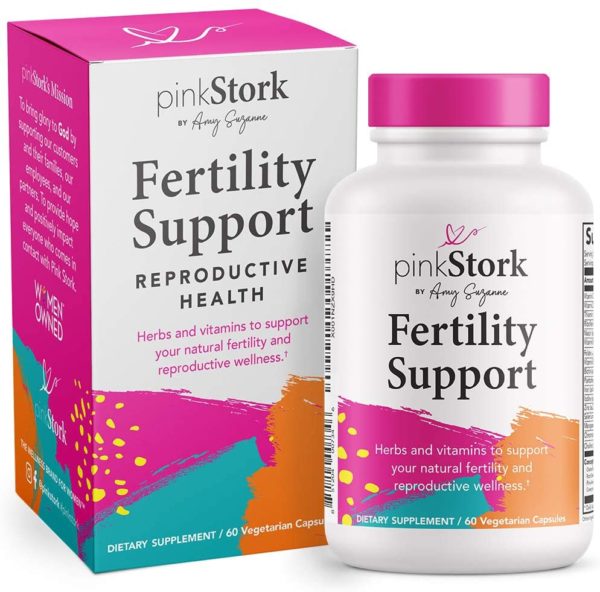
Pink Stork Fertility is a comprehensive vitamin, mineral, and herbal extract supplement you could think of as a preconception prenatal vitamin.
This supplement has everything from vitamin D to the B-complex vitamins, as well as trace minerals like chromium, selenium, and manganese.
It also includes a number of herbal extracts as part of a proprietary blend. These include top fertility ingredients like myo-inositol, plus herbal remedies like chaste tree berry and stinging nettle. It’s not a very targeted supplement, but this might be okay if you want to try a broad range of herbal compounds all at once.
5. FertilAid for Men
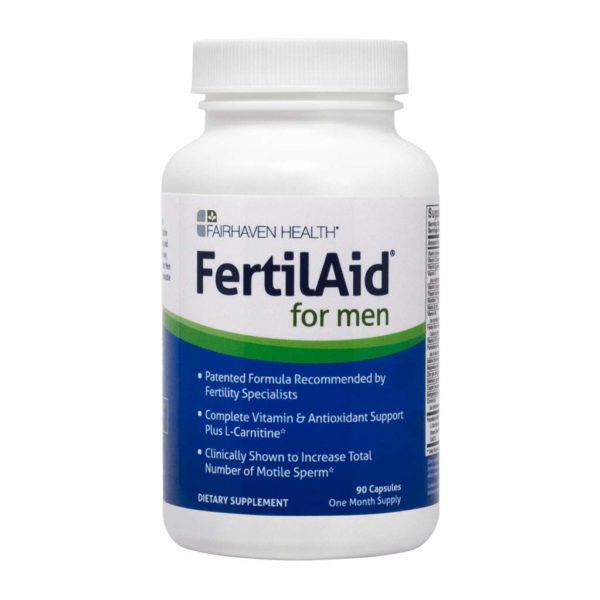
FertilAid for Men is like a prenatal vitamin for men. It replaces your normal multivitamin, as it includes quite large amounts of just about every essential vitamin and mineral.
This includes the mineral associated with low levels of sex hormones in men, like zinc, copper, and magnesium. In addition to these essential vitamins and minerals, you’ll find a proprietary blend of maca root, carnitine, grape seed, CoQ10, and ginseng extract.
These are all designed to improve sperm health and mobility, though the company does not disclose how much of each ingredient is included per capsule.
6. Vitamonk FertiliTrax
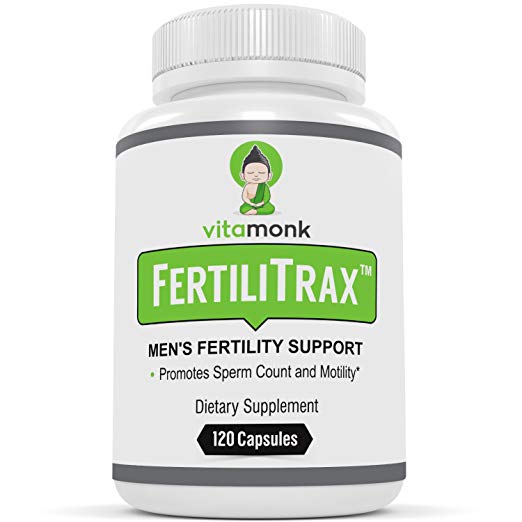
FertiliTrax is a supplement made by Vitamonk that is specifically designed for men’s fertility problems. It includes a number of vitamins, minerals, and herbal extracts to address all aspects of men’s fertility, from sexual libido and performance to sperm health and mobility.
Zinc, ginseng, and B vitamins help support androgen levels, and chrysin and CoQ10 support sperm health.
It doesn’t have all of the cutting-edge ingredients for fertility, but it could still be helpful for men whose fertility problems are in part related to poor libido and low testosterone.
7. Coast Science Male Fertility Supplement MFSg5
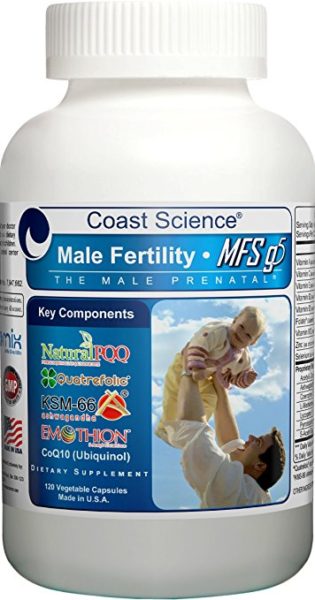
Coast Science Male Fertility Supplement MFSg5 is based mostly on vitamins A, C, B, and E, but you’ll also find a proprietary blend of a few less-common herbal extracts in this supplement too.
These include PQQ, a glutathione derivative, and ashwagandha. These are not the most well-studied herbal extracts for male fertility, so unless the mainstays aren’t working for you, this might not be a good first-line option.
8. NutraChamps Maca
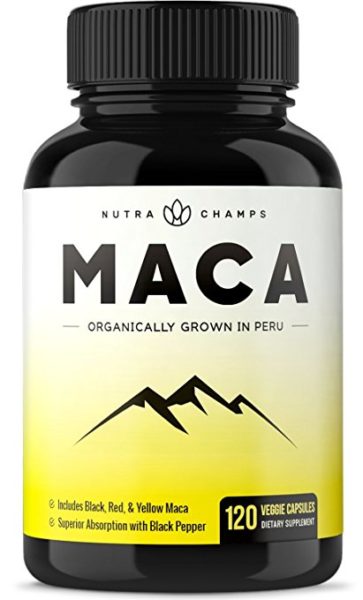
NutraChamps Maca uses a combination of maca root powder and black pepper extract, which is intended to boost the absorption and bioavailability of the active ingredients in maca root.
Maca root has some benefits for men’s sexual health, particularly when it comes to increasing libido. However, it’s not a well-studied supplement when it comes to addressing other aspects of men’s fertility problems, like sperm health, sperm count, and mobility.
NutraChamps Maca might help with libido, but for a broad-spectrum approach to male fertility enhancement, there are better options on the market.
9. Premama Fertility Support For Her
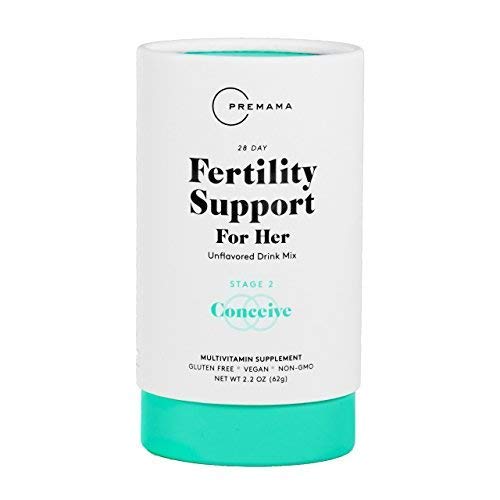
Premama Fertility Support For Her is a powder-based supplement that’s intended to be mixed into water instead of taken as a capsule.
It does have both folic acid and myo-inositol, which are important fertility supplements for women, but unless you are very averse to taking tablets, you can get the same ingredients without extra flavoring agents more easily elsewhere.
This supplement does have the advantage of being easily mixed into protein shakes and smoothies, however.
10. Windsor Botanicals Male Fertility
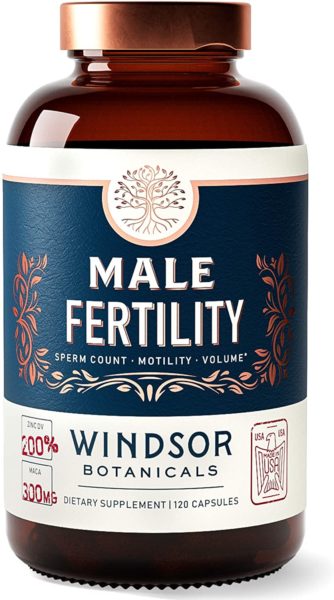
Windsor Botanicals Male Fertility is a supplement that delivers a blend of different herbal extracts like maca root, oat straw, ginseng, and licorice root, all of which are intended to boost fertility.
However, it takes more of a “shotgun approach,” as opposed to the more focused supplement design seen in higher-ranked fertility supplements.
Unless the specific ingredients of this fertility supplement appeal to you, there is probably a better option on the market.
Category winners
Best fertility supplement overall: Concepta Solutions Women’s Fertility Boost
For women looking to increase their fertility, Concepta Solutions has the best all-around supplement out there. With a blend of 14 different vitamins, minerals, and herbal extracts, it’s a great first choice if you want a broad spectrum fertility supplement.
Best fertility supplement for men: Eu Natural Conception Men
Fertility supplements aren’t just for women—Eu Natural Conception Men helps boost male sexual function for improved fertility with a combination of zinc, ashwagandha, selenium, and manganese, among other ingredients. The variety of ingredients makes it our recommendation for men.
Best fertility supplement for younger women: Concepta Solutions Women’s Fertility Boost
Concepta Solutions is great for younger women who want to ensure all of their bases are covered. The dosage of each individual ingredient is lower, but Concepta Solutions makes up for that with variety.
Best fertility supplement for women over 40: Everett Laboratories Pregnitude
Women over 40 benefit from the focused design of Everett Laboratories Pregnitude: it only includes two active ingredients, but they are both clinically proven to improve fertility and provided at high doses.
Best fertility supplement with zinc: Conception Men
Zinc is an excellent testosterone booster, and men with fertility problems often have low T. Conception Men is our pick for zinc-augmented fertility supplements, thanks to its highly bioavailable chelated form of zinc, and its broad variety of other ingredients for male fertility, like ashwagandha.
Best fertility supplement with folate: Pink Stork Fertility
Folate is a critical vitamin for infant health, and on this front Pink Stork is our favorite. This supplement is simultaneously a prenatal supplement and a fertility supplement thanks to the broad range of vitamins and minerals included.
Who should buy fertility supplements?
Fertility supplements are great for all individuals looking to improve their chances of conceiving. In general, fertility supplements are not nearly as effective as manipulating hormones but can be effective if your diet is lacking important nutrients key to proper fertility.
Children should never consume fertility supplements.
How we ranked
When ranking the best fertility supplements, the first thing we looked at was the ingredients. Certain nutrients have been scientifically proven to increase pathways of fertility in both men and women, so it was imperative those were included. Our top female fertility supplements, like Concepta, included omega-3 fatty acids vitamin D and folate to prevent neural tube defects, such as spina bifida. We did prefer products that included the activated form known as folate or 5-methyltetrahydrofolate (5-MTHF), which assists in the absorption and preventing miscarriages.
For male fertility supplements, we looked for products like VitaMonk that included testosterone boosting ingredients such as zinc, selenium, and ashwagandha. We also ranked products like Concepta highly because thy induced the sperm enhancing ingredients maca root, ginseng, and l-carnitine.
All the products that made our list are third-party tested for purity to ensure quality. We also made sure that these products contained minimal amounts of fillers, binders, and unnecessary ingredients. As such, products that hid behind a proprietary blend were immediately ranked lower.
Benefits
Fertility supplements include blends of vitamins, minerals, and herbal extracts designed to increase your ability to get pregnant. While many of these supplements are targeted at women, there are a number of products geared specifically for men. For women, fertility supplements help increase the quality of eggs released during ovulation, as well increase the probability that an egg will actually be released once a woman’s body attempts to ovulate.
For men, fertility supplements attempt to go beyond simple male enhancement: they strive to increase sperm quality and mobility as well.
The best fertility supplements for men and for women also help increase libido, sexual desire, and sexual wellness.
A fertility supplement with a combination of vitamins, minerals, and herbs could help women get pregnant. Typically, supplement research focuses on just one ingredient at a time, but a rare study published in 2006 in the journal Clinical and Experimental Obstetrics & Gynecology studied the type of combined-ingredient fertility supplement you’ll see ranked above (1).
The study included 93 women who were trying to get pregnant, but had not been successful in the past six to 36 months.
The women were randomly assigned them to either a placebo group, which received an inert supplement, or an experimental group, which took a fertility supplement once per day. The fertility supplement included vitamins, minerals, and herbal extracts like chaste tree extract and green tea extract.
Many, but not all, of these ingredients are similar to what you’d find in a prenatal vitamin. The women were followed for three months.
The researchers found that the proportion of women in the experimental group who got pregnant during the study’s duration (26%) was greater than the proportion of women in the control group who got pregnant during the study (only 10%).
After following the women for three more months, the proportion of women on the fertility supplement who had gotten pregnant had increased to 32%, while no additional women in the control group got pregnant.
The results of this study are promising because they suggest that, when taking a fertility supplement that provides the right vitamins, minerals, and herbal extracts, women could increase their probability of getting pregnant by three-fold over six months.
Two very effective fertility supplement ingredients for women are myo-inositol and folic acid. These supplements have been found to improve the quality of eggs released during ovulation, according to a study published in 2009 in the journal Fertility and Sterility (2).
The study randomly assigned sixty women to receive either a combined myo-inositol and folic acid supplement, or a supplement that delivered only folic acid.
The researchers followed the women and tracked egg quality during ovulation, and found a significant decrease in damaged or degeneration of eggs among the women taking myo-inositol in combination with folic acid, compared to the women who took only folic acid.
Many of the ingredients in fertility supplements for women can also help ensure the health of your baby. There is a nice conjunction between maternal health before becoming pregnant and the health of the baby.
It turns out that some of the same ingredients that make a women’s fertility supplement effective are also useful for giving birth to a healthy baby.
Further research into myo-inositol and folic acid found that blood levels of these compounds are also related to the risk of birth defects and diabetes in infants.
One study published in 2013 in the Journal of Maternal-Fetal & Neonatal Medicine studied pregnant women who were at risk of passing on diabetes to their babies (3).
The study randomly assigned half the women to a myo-inositol supplement, and half to a placebo. The researchers found a vastly decreased risk of diabetes in the women’s offspring in the group that was taking myo-inositol, compared to the placebo group.
Other research among women who had given birth to babies with birth defects found that higher levels of myo-inositol and higher levels of zinc were protective against having a baby with birth defects (4). These studies provide a strong case that your health and nutrition status before conception is related to the the health of your baby after you give birth.
Men’s fertility supplements that boost your antioxidant status can improve your fertility. For men, the primary concern with a fertility supplement is increasing the quality of sperm so you and your partner can increase the odds of getting pregnant.
One of the most important factors for sperm quality is antioxidant status: research has consistently associated poor antioxidant status with worse sperm health.
A study published in 2010 by researchers at a fertility clinic in Spain found that vitamin C intake was protective against having fertility problems, which they discovered by comparing men who reported to the fertility clinic against a similar group of healthy men who did not have fertility problems (5).
Other research published in the Journal of Andrology was able to demonstrate that vitamin E and selenium, two other nutrients with antioxidant properties, had significant benefits on sperm health and quality among a group of infertile men (6).
The findings from studies like these are why you’ll see high concentrations of antioxidants like vitamin C and vitamin E in many of the top men’s fertility supplements.
Side effects
Given that different fertility supplements have such a broad range of ingredients, the side effects for one supplement may not correspond to those of another.
The good news is that high-quality fertility supplements, and the top fertility ingredients, are quite safe. The largest trial of a combined fertility supplement for women reported no adverse effects (7), and myo-inositol shows only mild gastrointestinal side effects (8).
Further, these side effects only seem to appear at doses much higher than what you’ll find in a fertility supplement. Folic acid has a similarly stellar safety record at the most effective doses for fertility (9).
Recommended dose
While dosage varies from supplement to supplement, the right levels of some of the key ingredients have been studied.
Folic acid works best at a dose around 200 mg taken twice per day, while myo-inositol is taken in doses of up to 2 grams per day.
For men, antioxidants like vitamin E and vitamin C are taken at doses of several times the minimum recommended daily intakes.
FAQ
What nutrients can increase fertility? In addition to taking supplements specifically designed to help improve fertility, you can also improve your fertility by supplementing with the correct micronutrients through healthy foods. One study determined that when women consume greater amounts of Vitamins C, D, and E and minerals like iron and folic acid, they experience an increased chance of conception (10).
Another study analyzed some of the more popular fertility treatments for men to determine which ingredients were most effective in improving fertility. Of the dozens of vitamins, minerals, and amino acids found commonly in male fertility supplements, only five show some evidence of possibly affecting fertility levels, including Vitamin C, Vitamin E, L-carnitine, CoQ10, and zinc (11).
What type of diet improves fertility? One study concluded that males might experience greater fertility when consuming a diet high in antioxidants, while women may experience greater fertility when consuming a diet high in omega-3 fatty acids (12).
Generally speaking, nutrition has very little to do with fertility, as compared to major issues like lack of sperm and egg quality or hormonal and genetic issues but is still an important factor to consider.
Are fertility supplements expensive? Yes, the majority of fertility supplements on the market are somewhat expensive. It’s important to note that, since these supplements are not prescribed by a doctor, there are usually no guarantees that they will work for you or benefit your health.
Where can you buy fertility supplements? If you’re looking to purchase fertility supplements, the best place to find these products is online. You might also be able to find these products at health and wellness stores like GNC and The Vitamin Shoppe, though there are no guarantees.
What herbs improve the fertility of men and women? Though you may have read online that herbs can improve fertility, there is very little, if any, research that supports this concept. For the most part, the only websites that encourage using herbs are sites dedicated to herbal medicine or that sell herbal products, which are obviously biased sources.
In fact, there are some herbs that have been linked to a decrease in fertility, including St. John’s Wort, Ginkgo Biloba, and echinacea.
Which vitamins improve fertility? A majority of fertility supplements include vitamins, minerals, amino acids, and other ingredients in order to offer a potential boost to fertility. The most common vitamins associated with fertility include vitamin B6, B9, vitamin C, and vitamin D. Vitamin B9 helps to maintain ovulation and reduces some birth defects. Vitamin C helps to improve sperm motility and quality. Vitamin D helps to regulate ovulation and reduce the risk of developing endometriosis.
Do fertility supplements actually work? While it’s possible you might improve your fertility when taking fertility supplements, most fertility supplements will have no actual effects. One of the most significant reasons is because diet and supplements play a very small role when it comes to conception unless you’re eating an extremely unhealthy and nutrient-devoid diet.
What are the main causes of fertility issues? When men and women experience fertility issues, the major reasons are usually hormones, genetics, or physical issues. No amount of over-the-counter fertility supplements will be able to adjust your hormone levels, change your DNA, or alter your physical makeup to make conception more likely.
When advertising fertility supplements, there is a resounding focus on diet rather than these issues. The best thing you can do to address your fertility and chances of conception is scheduling an appointment with a fertility doctor that can help you address your needs.
What are the best foods for fertility? Specific foods are not as important as the nutrients they provide when it comes to attempting to improve fertility. When evaluating the role diet plays in fertility and ability to conceive, there is evidence that consuming a diet of seafood, fruits, vegetables, whole grains, and poultry may improve a woman’s ability to conceive and the quality of a man’s semen. You should be looking to eat foods high in antioxidants, which can improve the health of both eggs and sperm. Foods high in antioxidants include berries, spinach, and beans.
When the issue of fertility is due to ovulation, there is a greater chance of improving fertility if you’re eating more fiber in your diet. You should also make sure you’re getting enough iron in your diet. Foods high in iron include red meat, green vegetables, and eggs.
What foods should you avoid when trying to conceive? While there are things you should include in your diet, there are also things that you should attempt to limit as best you can. When consumed in excess, caffeine and alcohol can be determinantal to a person’s fertility. In normal amounts, you should not experience much of an issue with fertility, but cutting caffeine and alcohol out is a good starting point when trying to improve fertility.
Are there side effects of taking fertility supplements? If you’re taking fertility supplements in large quantities, you’re more likely to experience negative side effects, including nausea, headaches, and skin rashes. Most long-term effects associated with fertility supplements are as a result of too much folic acid.
How does phentermine affect fertility? Phentermine is a drug usually prescribed to aid patients looking to lose weight. Though not prescribed for the purpose of improving fertility, some consumers believe that the drug helped them to conceive a child. Other consumers noted that phentermine might pose a greater risk of birth defects and diseases if used when pregnant. There are no confirmations that prove phentermine is effective in boosting infertility, and there may be a risk of birth defects if you use phentermine when you’re pregnant (as there are many drugs and medications). If you find out that you’re pregnant while using the drug, you should consult your doctor, whom many recommend coming off of the drug.
Do prenatal vitamins boost fertility? Though you probably won’t experience a boost in fertility when taking prenatal vitamins, they do include some of the vitamins and minerals that have a possible connection to an increase in fertility. In particular, quality prenatal vitamins typically include vitamin D, calcium, iron, folic acid, and other important micronutrients. Prenatal vitamins most likely won’t increase your chances of conception, but it may be a good idea to take them if you’re planning to conceive in the near future. The major reason you should be taking prenatal vitamins when attempting to conceive is that it prepares the body and uterus for when a fetus begins to form. Overall, these vitamins and minerals assist in fetal development and can reduce the risk of diseases and birth defects.
How can you test your fertility? Before you begin taking fertility supplements or pursuing alternative conception methods, you and your partner should both have your fertility tested. If you’ve been experiencing trouble conceiving, having your fertility tested will help to determine on which end the struggle exists. To test your fertility, you need to see a medical professional that is considered a fertility specialist.
If you are a male and looking to have your fertility tested, one of the first things you’ll probably do is have your semen analyzed to determine the quality and motility of your sperm. In addition, it’s possible that you’ll undergo hormone and genetic testing to figure out a potential cause for infertility.
If you are a female and looking to have your fertility tested, the most common fertility tests include evaluating your ovulation and functioning of your reproductive system (Hysterosalpingography). Your doctor can also approximate how many eggs you have remaining and your hormone levels.
What are fertility supplements? Fertility supplements are health supplements that combine a variety of vitamins, minerals, and amino acids believed to increase fertility in humans. These supplements are available online or in-store and do not require a doctor’s prescription to purchase or use. Many of the more popular fertility supplements include similar ingredients that are assumed to affect fertility, including folic acid, vitamin E, vitamin C, and acetyl l-carnitine. In men, these nutrients have been shown to increase sperm quality and motility. In women, fertility supplements may enhance reproductive system functioning. However, because these supplements are sold over-the-counter, there are no medical guarantees associated with taking them.
What supplements can increase fertility? As mentioned earlier, you’re more likely to experience a positive effect from fertility supplements if they include specific vitamins, minerals, and amino acids. For men, Vitamin C, Vitamin E, L-carnitine, CoQ10, and zinc are nutrients you should look for in a fertility supplement. For women, Vitamin C, Vitamin D, Vitamin E, iron, folic acid, and many other nutrients are what you should look for when purchasing fertility supplements.
Other than selecting a fertility supplement that has these ingredients, there are no real guarantees that the supplement will produce the intended results.
When should you use fertility supplements? The average person should never even consider using fertility supplements because of the lack of evidence that they actually work. Another reason that you should avoid using fertility supplements is that they focus on diet and nutrients rather than the major issues that may be causing infertility. The best thing you can do to improve your odds of conceiving is going to a medical professional and determining the reason behind your infertility and medical methods you can pursue in order to become pregnant.
If you’ve exhausted all of the potential medical issues like genetics, hormones, ovulation, egg, and sperm issues, then you may want to try fertility supplements, as there is a chance your infertility was a result of your diet and lack of specific nutrients.
Related articles
Recap
Fertility supplements exist that can increase the chance that you and your partner can get pregnant.
Supplements for women focus on stimulating the release of healthy eggs, many studies have found ingredients like folic acid and myo-inositol to be effective both at increasing your chances of becoming pregnant and of giving birth to a healthy baby.
Supplements for men tend to focus on increasing sexual health and boosting your antioxidant status, as higher levels of antioxidants mean healthier sperm and a better chance at conception.
For BodyNutrition’s #1 fertility supplement recommendation, click here.